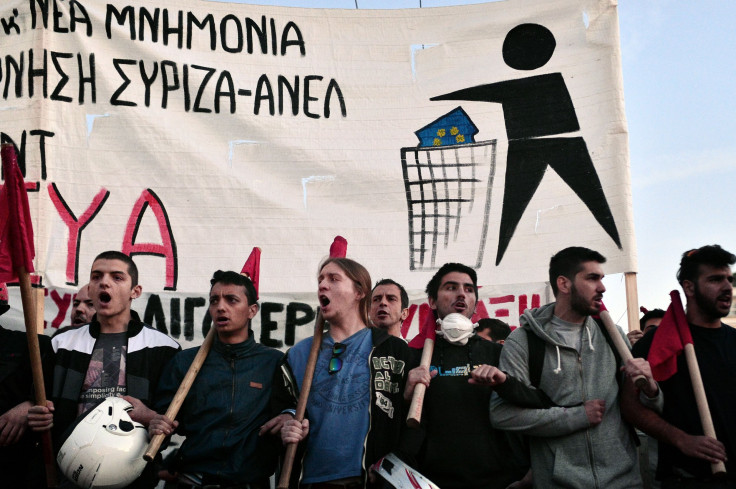Greek Debt Crisis: Eurozone Finance Ministers To Meet In Brussels As Talks Falter Over Contingency Measures

Finance ministers from the 19-nation eurozone will hold an emergency meeting in Brussels Monday with the aim of staving off another economic crisis in Greece. The meeting comes amid growing public unrest in the debt-ridden nation, where lawmakers on Sunday approved a raft of deeply unpopular austerity measures, including tax hikes and pension cuts.
“The Eurogroup will discuss the state of play of the first review of the macroeconomic adjustment program to Greece. The Ministers will be informed by the institutions and the Greek authorities on the progress achieved in the discussions on the package of reforms required to complete the first review,” the official agenda of the meeting, released last week, stated. “The Eurogroup will also discuss possible debt relief measures aiming at ensuring that Greece's gross financing needs remain at a sustainable level, with a view to reach a political agreement."
Greece and its international creditors — eurozone member nations and the International Monetary Fund — agreed upon a third rescue package worth 86 billion euros ($94 billion) last year. However, unlocking the next tranche of the bailout has proven difficult, with Greece and its creditors clashing over the need for more reforms in the country.
The IMF and Greece’s European creditors have demanded that Athens implement fiscal “contingency measures” to put aside nearly 3.5 billion euros in additional savings that would be triggered if the government misses its budget targets.
However, the Alexis Tsipras-led Greek government, which came to power on an anti-austerity plank and is now under fire from domestic anti-austerity campaigners and trade unions for its perceived capitulation, has argued against the measure. The government says that implementing the measure is politically and legally impossible — a stand that Pierre Moscovici, the European Union’s economic affairs commissioner, lent support to, underscoring a disagreement between the IMF and the euro area.

“The mechanism is a way to have measures if necessary, but in our view we don’t need a precise, detailed set of measures,” Moscovici reportedly said Thursday. “It is certainly difficult for any parliament or government to legislate upfront for eventual measures to be taken in three years from now.”
The deadlock has triggered concerns that Athens may not be able to meet its next debt deadline in July, when it is due to repay 300 million euros to the IMF and 2.3 billion euros to the European Central Bank.
“While creditors fight this out, the political and social situation in Athens will deteriorate,” Mujtaba Rahman, head of European analysis at risk consultancy Eurasia Group, told the Guardian. “Time is running out for creditors to come to an agreement.”
© Copyright IBTimes 2024. All rights reserved.












